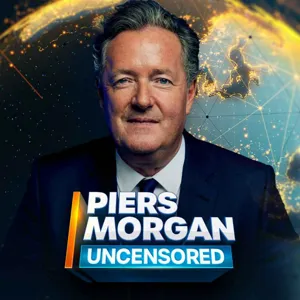Podcast Summary
Staying Constant in a Changing World: Health Insurance, Quality Outdoor Furniture, and COVID-19: Stay informed and adapt to new circumstances by securing reliable health insurance, investing in durable outdoor furniture, and understanding the complexities of the pandemic.
Despite the rapidly changing world, some things remain constant. For instance, the need for health insurance and the importance of quality outdoor furniture. UnitedHealthcare TriTerm medical plans offer flexible and budget-friendly coverage for those in between jobs or missed open enrollment. Burrow's outdoor collection is built to withstand the elements, ensuring your investment lasts. Meanwhile, in the realm of information, the ongoing COVID-19 pandemic has sparked intense debates. Jonathan Howard's book, "We Want Them Infected," sheds light on the failed quest for herd immunity and the rise of the anti-vaccine movement. Comedian Dave Anthony, host of "The Dolla," provides a unique perspective on historical events related to the pandemic. While reactions to the book have been mixed, it's clear that the conversations around COVID-19 and its implications continue to evolve. In the face of this ever-changing landscape, it's essential to stay informed and adapt to new circumstances. Whether it's securing reliable health insurance, investing in durable outdoor furniture, or understanding the complexities of the pandemic, being prepared for what tomorrow brings is key.
Controversial medical book during pandemic meets criticism and name-calling: Author remains committed to backing up arguments with evidence, despite criticism focusing on commercial performance and lack of data-driven discussions.
The author's experience writing and publishing a controversial medical book during the pandemic has been met with criticism and name-calling from colleagues, rather than engaging in data-driven discussions. Despite the challenges, the author remains committed to backing up their words with evidence and data. Critics have focused on the book's commercial performance, rather than the content itself, and have not attempted to refute the arguments presented. The author finds some humor in the situation but acknowledges that it's sad that this is how medical professionals communicate during the pandemic. The author remains undeterred and plans to present the evidence from the book during the event. Additionally, the author has been surprised by the book's mainstream press, including a review in the LA Times and Psychology Today, despite having no connections in the publishing industry. The book is currently the 327,100th best-selling book on Amazon six months after publication.
Controversial book on COVID-19 response sparks intense debates: Author's controversial book on COVID-19 response elicits strong reactions, igniting debates and advocacy for non-compliance with public health guidelines, while the author, concerned for marginalized communities, believes the current response is unsustainable and will have dire consequences
The author of a controversial book on public health responses to the COVID-19 pandemic has been surprised and gratified by the strong reactions it has elicited, despite initially expecting only a small audience. The book, which some critics argue is intentionally infuriating, has sparked intense debates and strong opinions, with some doctors and public figures advocating for non-compliance with public health guidelines. The author, Dave Smith, has become deeply involved in the topic due to his background in history and his concern for the downtrodden, as well as his personal connection to immunocompromised individuals. He finds the ongoing debates and responses to the pandemic horrifying, particularly the impact on those who are already marginalized or vulnerable. Smith's long-term perspective on the situation leads him to believe that the current response is unsustainable and will have dire consequences over time.
The Value of Critical Thinking and Historical Knowledge: Recognizing the importance of critical thinking and historical knowledge can provide unique perspectives and insights, even when others dismiss warnings as crazy. Consider motivations behind arguments and prioritize the greater good over individual freedoms for long-term benefits.
Having a deep understanding of history and being able to analyze information thoroughly can provide unique perspectives and insights that others may not have. This was evident in the discussion about Cassandras, who are often seen as warning of impending danger, even if others dismiss their warnings as crazy. The speaker shared personal experiences of being dismissed for predicting events like Trump's presidency and the housing crisis. He also emphasized the importance of considering the motivations behind arguments, especially when it comes to contentious issues like mask mandates and vaccines. The speaker believed that those who opposed such measures were not truly acting in the best interests of the downtrodden, but rather prioritizing their own freedoms over public health. He encouraged a long-term perspective, recognizing that temporary sacrifices could lead to greater benefits in the future. Overall, the conversation highlighted the value of critical thinking, historical knowledge, and a holistic approach to understanding complex issues.
Understanding Long COVID: Symptoms and Impact: The definition and impact of long COVID are still unclear, leading to varying estimates of its prevalence. It's crucial for the medical community to reach a consensus on its definition for accurate diagnosis and effective treatment.
The definition and understanding of long COVID, its symptoms, and its impact on people's lives are still unclear and a subject of ongoing research and debate among medical professionals. The lack of consensus on the definition and diagnosis of long COVID leads to varying estimates of its prevalence. Additionally, concerns about long COVID should not be used to disregard other health issues or discrimination against certain populations. It's crucial for the medical community to come to a consensus on the definition of long COVID to ensure accurate diagnosis and effective treatment. Furthermore, it's essential to approach health concerns with genuine and consistent concern, rather than selectively focusing on specific issues for political or personal gain.
The complex history of vaccines in America and the challenges of debating conspiracy theories during the COVID-19 pandemic: Understanding historical context and committing to factual accuracy are essential for effective and fair debates about vaccine-related conspiracy theories during the COVID-19 pandemic.
The history of vaccines in America, particularly the early ones, is complex and fraught with issues that seem to have been forgotten in the face of recent events. Dave, as a historian, emphasizes that we have failed to learn from the past, and the COVID-19 pandemic response has only added to the confusion. Misinformation spreads easily, and verbal debates often reward the best speaker rather than the person with the most accurate information. The lack of transparency and information from the government has left a void that is filled with misinformation. The author, Jonathan, has faced numerous challenges to debate about various conspiracy theories surrounding the pandemic, but he believes that written debates are more effective and fair. The strategy of calm debaters spreading misinformation while their opponents become angry and lose credibility is a concern. Therefore, it's crucial to approach discussions with a clear understanding of historical context and a commitment to factual accuracy.
Misinformation from medical professionals during COVID-19: Despite being experts, some medical professionals shared incorrect info during COVID-19, causing real-world consequences and damaging trust.
The inconsistency and incorrect information shared by some medical professionals during the COVID-19 pandemic, despite having started out as reasonable experts, led to a loss of trust and credibility. These individuals, who have built an audience through retweets and growing interest, have made mistakes about other people's lives and seem unwilling to correct them. The consequences of their words had real-world effects, but they were often shielded from the consequences themselves. For instance, Dr. John Ioannidis, a renowned scientist and epidemiologist in the US, made a statement in March 2020 that downplayed the severity of COVID-19, which had significant real-world consequences. While it's important to remember that everyone makes mistakes, the issue lies in the persistent and uncorrected misinformation.
Experts underestimating COVID-19 severity: Experts should acknowledge mistakes and adapt to new info, not cling to outdated assumptions or spread misinformation.
During the early stages of the COVID-19 pandemic in 2020, some experts underestimated the severity of the virus and continued to minimize its impact despite mounting evidence to the contrary. For instance, one doctor predicted fewer than 40,000 deaths in the USA, but the number of deaths surpassed that mark within a week. Instead of acknowledging their errors, some experts pivoted and spread conspiracy theories about the virus and its impact, including the harm caused by lockdowns and the reliability of death certificates. This behavior was not unique and was a common theme during that time. The lesson here is that it's important for experts to acknowledge their mistakes and adapt to new information, rather than clinging to outdated assumptions or spreading misinformation.
Doctors' conflicting views on COVID-19 severity: Early on in the pandemic, some doctors underestimated its severity due to limited exposure to hard-hit areas, causing confusion among the public and medical community
During the early stages of the COVID-19 pandemic, there were conflicting views among medical professionals regarding the severity of the situation and the necessary measures to contain it. Some doctors, like John Mandrola, downplayed the need for strict public health measures, arguing that hospitals were not being overwhelmed and that the virus was not as dangerous as initially thought. However, their perspectives were not based on firsthand experience in hard-hit areas like New York, but rather on the success of containment efforts in their own regions. This led to a significant disconnect in the medical community's response to the pandemic and caused confusion for the public.
The Debate Over Lockdowns and Public Health Measures: Despite acknowledging personal privilege, the speaker criticizes the politicization of lockdowns and argues for sensible public health measures like mask mandates as an alternative.
The debate surrounding lockdowns and public health measures during the COVID-19 pandemic has been polarized, with some arguing for the intergenerational harm caused by these measures, while others see them as necessary for controlling the spread of the virus. The speaker acknowledges their own privilege during the lockdowns and the significant impact on small business owners and the working class. They argue that mask mandates and sensible public health measures could have been an alternative, but the politicization of the issue made it untenable. The speaker also notes the historical precedent for fear and hysteria surrounding public health measures, including the comparison of masks to Nazi Germany, which they dismiss as a baseless and dangerous comparison. Ultimately, the speaker expresses disappointment that the pandemic did not lead to a more widespread acceptance of public health measures and a culture of care for each other's wellbeing.
Historical opposition to vaccines and public health measures: Despite the historical recurrence of vaccine skepticism and resistance to public health measures, it's crucial to learn from past experiences and adapt our responses to current challenges.
The opposition to vaccines and public health measures is not a new phenomenon. As early as the late 1700s, there were anti-vaccine sentiments and riots during smallpox outbreaks. Benjamin Jeste, a farmer who vaccinated his children, faced similar backlash. Fast forward to the COVID-19 pandemic, and we see similar debates and misconceptions. Doctors like Jay Bhattacharya and Scott Atlas advocated for herd immunity through intentional infection, disregarding potential negative consequences beyond death. These events demonstrate that while history may seem repetitive, it's essential to learn from it and adapt our responses to new challenges.
Early declarations of herd immunity to COVID-19 lacked solid evidence: Overconfident claims about COVID-19 immunity, based on comparisons to measles or chickenpox, were made without long-term data or consideration of variants. Acknowledging pandemic's impact on marginalized communities and staying cautious is crucial.
The early declarations of herd immunity to the COVID-19 pandemic, made with extreme confidence, were not based on solid evidence. This overconfidence was evident in tweets and public statements by doctors and media personalities, who compared the novel virus to measles or chickenpox, despite the lack of long-term data on immunity and variants. The discussion also touched upon the importance of acknowledging the impact of the pandemic on marginalized communities, such as black and Hispanic children and teenagers, who faced higher suicide rates during the early stages of the pandemic. The speaker shared a personal experience of a baseball team member who contracted MIS-C, a condition related to COVID-19, and how his illness brought unexpected popularity to him on the team. The conversation also highlighted the importance of remaining cautious and humble in the face of a new and unknown disease.
Public figures' optimistic outlooks during COVID-19 met with skepticism and criticism: Despite the best intentions, public figures' optimistic statements about the end of the COVID-19 pandemic were controversial and contributed to a wider narrative that the crisis was over. It's essential to rely on credible sources and scientific evidence when making decisions about health and safety.
During the COVID-19 pandemic, there were several public figures, including doctors, who declared the end of the crisis and encouraged people to return to normal life despite the ongoing risks. Some of these individuals gained significant attention and influence, with their messages resonating with those who were tired of the fear and uncertainty. However, their optimistic outlooks were often met with skepticism and criticism from experts and the public alike. For instance, Dr. Scott Atlas, a former White House advisor, was criticized for herd immunity advocacy and being used as a tool to get people back to work. Other doctors, such as Marty Makary and Martin Kulldorff, also predicted an early end to the pandemic and downplayed the risks. Elon Musk, a tech entrepreneur, also expressed optimism about the pandemic's end. Despite their intentions, which were not necessarily malicious, these individuals' statements were controversial and contributed to a wider narrative that the pandemic was over. It's important to remember that the COVID-19 crisis is complex, and the situation is constantly evolving. As such, it's crucial to rely on credible sources and scientific evidence when making decisions about one's health and safety.
Exploring untold stories through podcasts: Podcasts like 'The History of the American Revolution' and 'The Audit' offer unique perspectives and challenge common misconceptions, revealing important historical facts and media influences.
There are important historical stories and perspectives that aren't always covered in traditional classrooms or textbooks. Listening to podcasts like "The History of the American Revolution" or "The Audit" can provide valuable insights and corrections to common misconceptions. For instance, the Benedict Arnold story offers a side of history that may not have been taught in class, revealing how it's been misrepresented in history books and popular culture. It's a great starting point for those new to the show. Additionally, understanding the influence of right-wing media and figures, as discussed on "The Audit," is crucial in today's world, especially as they infiltrate schools. By staying informed, we can use the knowledge gained to challenge inaccurate narratives. Lastly, remember that life's special occasions deserve thoughtful and high-quality gifts, and resources like 1800flowers.com and Quince can help make those moments memorable without breaking the bank.






